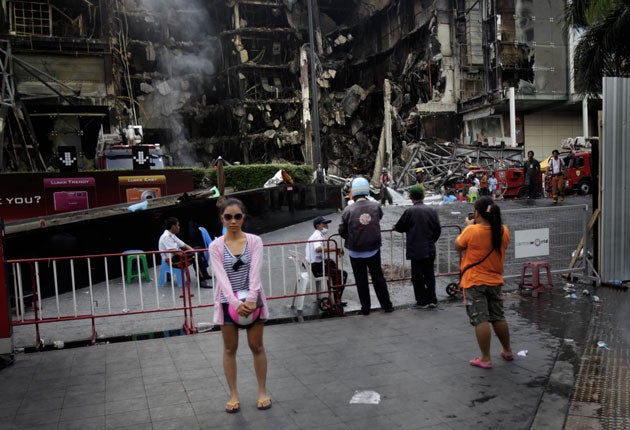Backpackers pack their bags and leave Bangkok in droves
Thai capital's hotels, shops, cafés and conference centres all report a drastic drop in custom

The bars along Khao San Road in Bangkok are virtually empty, the throngs of backpackers who nor-mally make this strip a bustling tourist centre having deserted the Thai capital after violent anti-government protests.
Bangkok's night curfew has meant that even the city's notorious girly bars are boarded up at night, their neon lights dead. The few travellers who sit in Khao San's street-front bars, enjoying a cool beer in the hot afternoon, will retreat to their nearby hotels by 9pm when the curfew is enforced by soldiers.
Occupancy rates in the city's budget hotels have plummeted from a normal 80 per cent to, at best, 10 per cent. The Viengtai Hotel has 205 rooms but only 13 are occupied with 23 tourists. The nearby Khaosan Park Resort is the same. Each day the Viengtai Hotel receives cancellations, sometimes as many as 10, as people are still wary of coming to Bangkok, despite calm returning to the city after troops put down a nine-week protest on Wednesday.
The military crackdown killed at least 15 people and wounded nearly 100. A total of 53 people have died and 415 been wounded since the unrest flared on 14 May. "It's very bad," said Warapha Noirod, a receptionist at the Viengtai. "We have bookings, but they are cancelling." The hotel's staff have seen their commission on bookings cut from around 3,000 baht (£64) a month to 1,000 baht and fear next month's commission may be as low as 800 baht.
The protests have decimated Thai tourism, which accounts for 6 per cent of GDP and employs 15 per cent of the workforce, and could have a significant impact on growth in South-east Asia's second-largest economy, says the Finance Minister, Korn Chatikavanij. Surapol Sritrakul, president of the Association of Thai Travel Agents, expects foreign arrivals of between 12 and 13 million people this year, down from 14.5 million in 2009. "We're assessing the damage. The impact is very severe this time, and it could take six months for the industry to recover," Mr Surapol said.
Siam Katuwal, a designer at Overseas Tailor, sits in his air-conditioned shop with nothing to do. Only one tourist has walked through his doors this week and ordered one shirt. "Before the troubles I could serve six people in a week and they would order two suits, extra trousers and shirts," he said. "I'm not happy. I hope by the end of this month it will end and get back to normal."
The Khao San Road area was featured in the 2000 Hollywood film The Beach, starring Leonardo DiCaprio, and is popular with young travellers on tight budgets.
Backpackers on the street say travellers who have decided to come to Bangkok are staying close to their hotels and have cut their stays to a day or two. "I thought about not coming, but in the end I came for only one day," said 19-year-old Wouter De Vries from Holland.
At the height of the protests, on 19 and 20 May, passengers passing through Bangkok's main Suvarnabhumi airport fell by 50 per cent to around 60,000 a day, said its director, Niran Thiranartsin. Bangkok's top hotels are also suffering, with many located close to the protest battleground, the city's ritzy shopping precinct. The 420-room Sheraton Grande Sukhumvit Hotel has seen its occupancy fall to 30 per cent from 80 per cent earlier in the year. "Ninety-five per cent of our visitors are from overseas. Most people have deferred travelling to this country," said the general manager, Richard Chapman. "It is tragic. I really didn't dream that we would ever have a situation like we just experienced. It will take some time before we build back confidence," he said.
Starwood Hotels has 13 Thai hotels and still plans to open six more in 2010, but some opening dates will be pushed back. "Most sectors of the tourism industry have been affected, from business travellers to holidaymakers, to meetings and incentives," said Nelli Yong, Starwood Hotels' vice president for brand management. "The most significant impact has been in the meetings and groups segment, as it is presently difficult for travellers to obtain travel insurance to Thailand," she said. "In order to attract visitors back, we need stability, so that people are confident of being able to conduct business and to enjoy their holidays in peace and comfort without disruptions."
Join our commenting forum
Join thought-provoking conversations, follow other Independent readers and see their replies
Comments
Bookmark popover
Removed from bookmarks